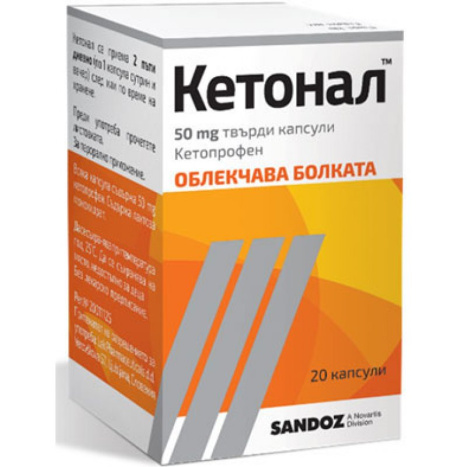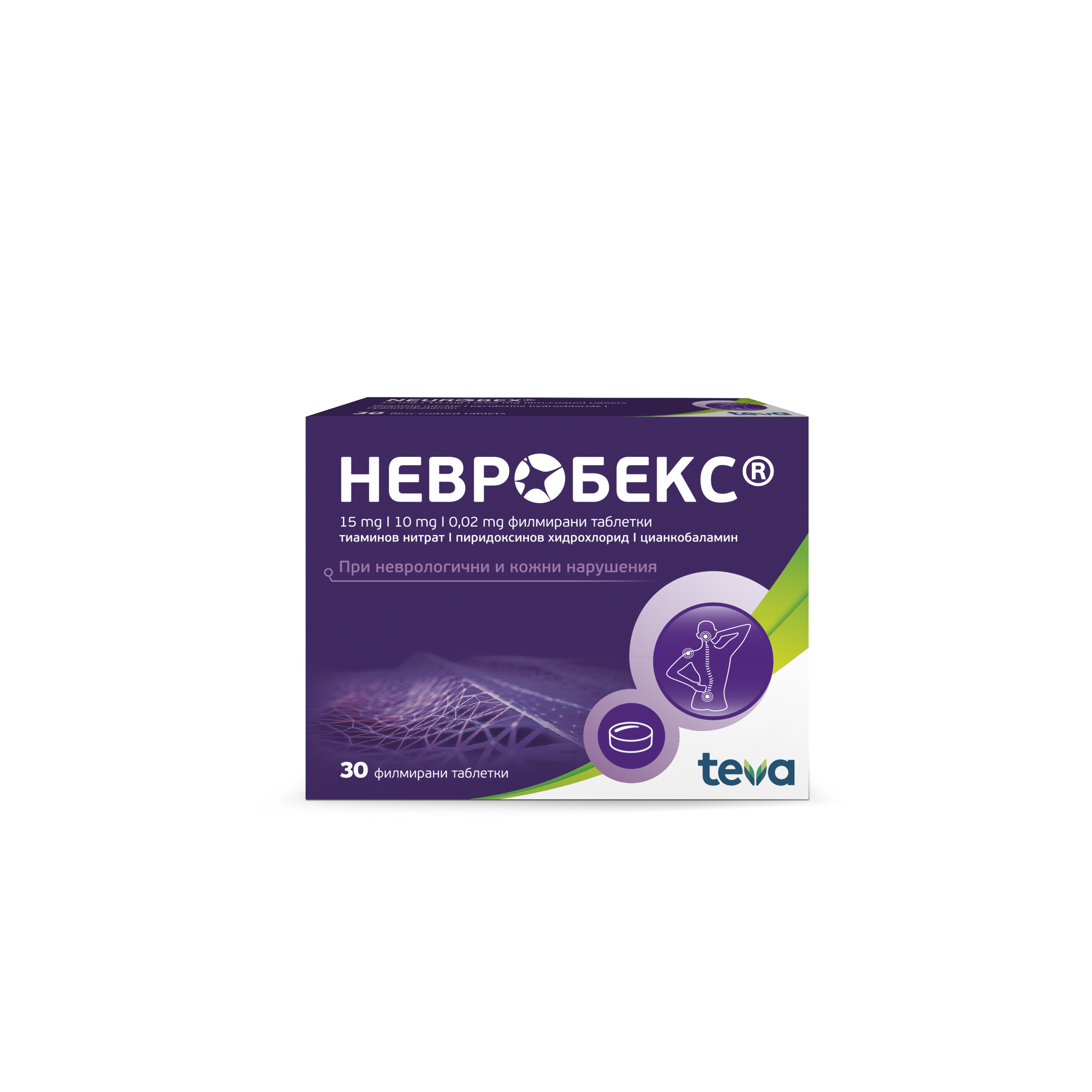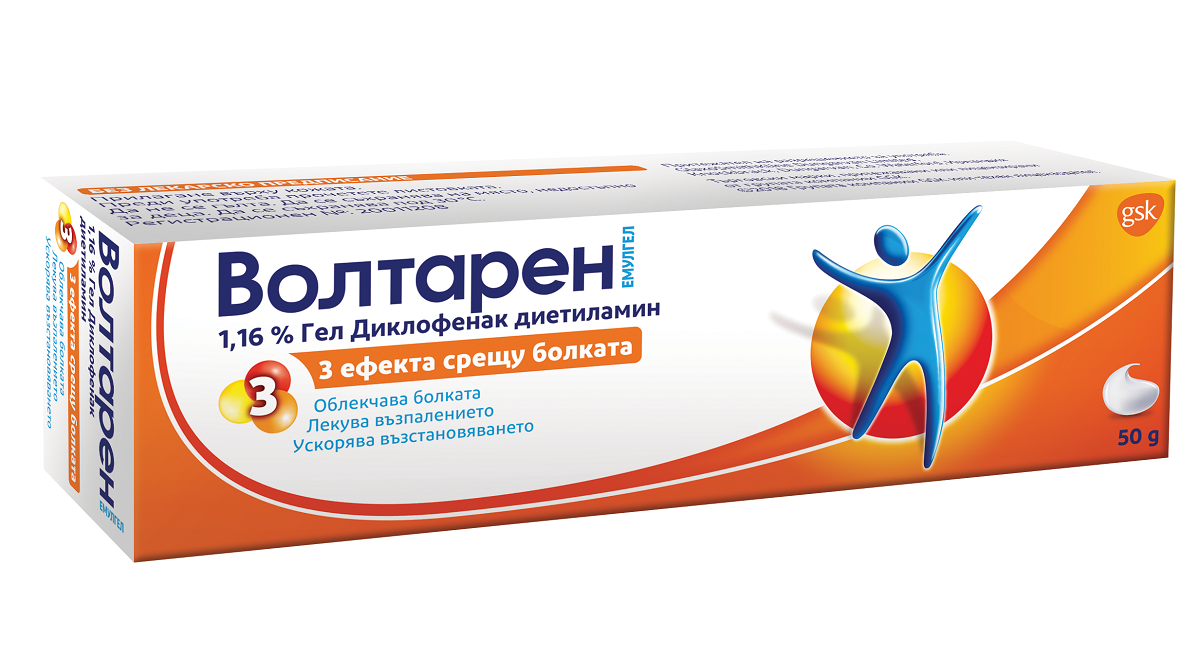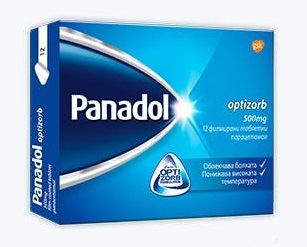KETONAL 50mg x 20 caps
KETONAL capsules 50 mg * 20
Leaflet: user information
Ketonal 50 mg hard capsules
Ketonal 50 mg capsules, hard
Ketoprofen (Ketoprofen)
Read all of this leaflet carefully before you start taking this medicine because it contains important information for you.
Always take this medicine exactly as described in this leaflet or as your doctor or pharmacist has told you.
Keep this leaflet. You may need to read it again.
If you need further information or advice, ask your pharmacist. If you get any side effects, tell your doctor or pharmacist. This also includes any possible side effects not described in this leaflet. See point 4.
If after 3 to 10 days you do not feel better or your condition worsens, you should seek medical attention.
What this leaflet contains:
1. What is Ketonal and what is it used for?
2. What should you know before taking Ketonal?
3. How to take Ketonal?
4. Possible side effects.
5. How to store Ketonal?
6. Contents of the package and additional information.
1. What is Ketonal and what is it used for?
The active substance of Ketonal is ketoprofen, which belongs to the group of non-steroidal anti-inflammatory drugs. Ketonal relieves pain and has an anti-inflammatory and antipyretic (temperature-reducing) effect.
What is Ketonal used for?
For the symptomatic treatment of conditions associated with mild to moderate pain associated with cold and fever, headache, toothache, pain after dental surgery, muscle pain, joint pain, back pain, mild arthritic pain, menstrual pain;
• For the short-term treatment of pain conditions associated with osteoarthritis, ankylosing spondylitis, gouty arthritis, painful musculoskeletal conditions/post-traumatic pain (including eg: related to sports injuries), post-operative pain, low back pain.
2. What should you know before taking Ketonal?
Do not take Ketonal
• If you are allergic to ketoprofen or any of the other ingredients of this medicine (listed in section 6)
• If after taking ketoprofen or similar active substances such as acetylsalicylic acid (aspirin) or other non-steroidal anti-inflammatory drugs, you have experienced difficulty breathing, an asthma attack, swelling of the mucous membrane and nasal congestion or discharge (rhinitis), skin reactions (edema or itchy rash) or any other allergic reactions;
• If you have an active stomach or duodenal ulcer, or if you have had gastrointestinal bleeding, ulcer or perforation in the past
• If you suffer from severe liver and kidney disease;
• If you suffer from severe heart failure;
• If you have a tendency to bleed;
• If you are pregnant in the last trimester of pregnancy;
Warnings and precautions:
Talk to your doctor, pharmacist or nurse before taking Ketonal.
Pay special attention when using Ketonal
• If you have had gastrointestinal problems in the past. You should be aware that non-steroidal anti-inflammatory drugs (NSAIDs) can cause sudden ulceration, bleeding or perforation of the stomach or intestines, sometimes with a fatal outcome. These effects may occur at any time during treatment, regardless of whether there have been previous symptoms or a history of serious gastrointestinal reactions in the past. The risk of bleeding from the gastrointestinal tract, occurrence of or perforation increases with increasing doses of NSAIDs, in patients with a history of ulcer, especially if it has been complicated by hemorrhage or perforation (see section 2), as well as in patients in old age. Ketoprofen may be associated with a high risk of gastro-intestinal toxicity, which is also characteristic of some other NSAIDs, especially at high doses. Your doctor will prescribe the lowest possible dose for the shortest possible time.
If these conditions are observed in you, as well as if you need to be additionally treated with acetylsalicylic acid (ASA) or other drugs that could increase the risks related to the gastrointestinal tract, your doctor may recommend simultaneous treatment with preventive agents (such as misoprostol or proton pump inhibitors). Patients who have had problems with the gastrointestinal tract in the past when taking such drugs, especially when they are elderly, should report any unusual symptoms in the abdominal area (especially bleeding) and especially at the initial stage of treatment. If ulceration or bleeding from the gastrointestinal tract occurs in patients taking Ketonal, the intake should be stopped immediately.
• If you are taking medicines that increase the risk of ulceration or bleeding, such as oral corticosteroids, anticoagulants such as warfarin, certain antidepressants (SSRIs - selective serotonin reuptake inhibitors) or antiplatelet agents such as acetylsalicylic acid (aspirin).
• NSAIDs should be used with caution in patients with a history of gastrointestinal disease (ulcerative colitis, Crohn's disease), due to possible exacerbation.
• If you suffer from asthma, chronic rhinitis (blocked nose and/or discharge from the nose), chronic sinusitis, nasal polyps.
• If you have or have had heart, liver or kidney disease.
• If you have or have had in the past high blood pressure (arterial hypertension) and heart failure with edema, ischemic heart disease. Regular monitoring is required in patients with hypertension and/or mild to moderate congestive heart failure, as fluid retention and edema have been reported during NSAID treatment. Medicines such as Ketonal may be associated with a slightly increased risk of heart attack (myocardial infarction) or stroke. The risk increases with higher doses and longer duration of treatment. Do not extend the recommended duration of treatment.
• If you have previous heart disease, stroke or think you are at increased risk of having one (for example high blood pressure, diabetes, high cholesterol or if you are a smoker) you should discuss your treatment with your doctor or pharmacist
• If you have peripheral or cerebrovascular disease.
Taking Ketonal should be stopped at the first symptoms of skin rash, mucosal disorders or other signs of hypersensitivity. There have been very rare reported cases of severe skin reactions with redness and blistering associated with the use of NSAIDs, sometimes with a fatal outcome (see also section 4). Patients are thought to be at greatest risk of developing such conditions early in treatment. In the largest percentage of cases, the onset of these manifestations is within the first month of treatment.
• If you have an infectious disease.
• In women of childbearing age, administration of this drug may cause reversible suppression of fertility. In women who are unable to conceive or are undergoing sterility studies, Ketonal should be discontinued.
• If you are elderly. You should be closely monitored for any unusual symptoms (especially gastrointestinal bleeding), especially at the start of treatment. Your doctor will also monitor you more closely.
• If you are being treated with other NSAIDs, including selective cyclooxygenase 2 inhibitors (COX-2 inhibitors).
• If you have the rare hereditary conditions of intolerance to some sugars, namely: hereditary galactose intolerance, Lapp-lactase deficiency or glucose-galactose malabsorption. Ketonal capsules contain lactose monohydrate and such patients should not use them.
• Ketonal can mask the symptoms of infection and fever.
Adverse reactions can be minimized by using the lowest effective dose for the shortest possible duration of treatment necessary to control symptoms. Do not exceed the recommended dose or duration of treatment.
Children and adolescents
Use in children and adolescents under 18 years of age is not recommended.
Inform your doctor if any of the conditions described apply to you.
Other drugs and Ketonal
Tell your doctor or pharmacist if you are taking, have recently taken or might take any other medicines.
The simultaneous use of Ketonal with the following drugs is not recommended:
• Other pain relievers such as NSAIDs (eg acetylsalicylic acid, diclofenac, naproxen) as well as selective cyclooxygenase 2 (COX-2) inhibitors.
• Medicines that are anticoagulants and destroy blood clots (ie suppress/prevent blood clotting such as acetylsalicylic acid, clopidogrel, ticlopidine, heparin or warfarin)
• Lithium (for the treatment of mania and depression): because of the risk of increasing lithium levels in the blood, which can sometimes reach toxic levels. When necessary, the level of lithium in the blood should be closely monitored and adjusted during and after Ketonal therapy.
• Methotrexate (for the treatment of malignant diseases) in doses higher than 15 mg per week: due to an increased risk of haematological toxicity of methotrexate.
Medicines that can affect or be affected by simultaneous use with Ketonal. It is necessary to consult your doctor or pharmacist before using Ketonal with other medicines, such as:
• Medicines that increase the excretion of urine and/or increase the amount of urine excreted (diuretics or the so-called "water pill"): patients, especially dehydrated patients, taking diuretics are at increased risk of developing kidney failure. Such patients should be rehydrated before co-administration and renal function should be monitored when treatment is initiated. Diuretics increase the risk of NSAID nephrotoxicity. Ketonal reduces the effect of diuretics.
• Medicines prescribed for high blood pressure (ACE inhibitors, diuretics and angiotensin P antagonists, such as losartan): in patients with impaired renal function (e.g. dehydrated patients or elderly patients) the simultaneous use of Ketonal with these medicines may additionally worsen kidney function and even cause acute kidney failure.
• Methotrexate in doses lower than 15 mg per week: during the first weeks of concomitant administration, a complete blood count should be monitored weekly. If there is a change in kidney function or if the patient is elderly, control should be carried out more often.
• Corticosteroids (used for many conditions such as pain, swelling, allergies, asthma, rheumatism and skin problems): due to increased risk of gastrointestinal ulceration or bleeding.
• Pentoxifylline (a medicine used against muscle pain due to peripheral vascular disease; reduces the thickness of the blood and is prescribed for various diseases of the arteries and veins): due to an increased risk of bleeding. More frequent clinical monitoring and control of bleeding time is required.
Medicines, the simultaneous use of which with Ketonal requires caution:
• Antihypertensive agents (medicines prescribed to treat high blood pressure - beta-blockers, angiotensin-converting enzyme inhibitors, diuretics): Ketonal reduces the effects of antihypertensive agents.
• Thrombolytics (medicines that "dissolve" the formed clots: due to increased risk of bleeding).
• Selective serotonin reuptake inhibitors (SSRIs) (prescribed for depression); due to an increased risk of gastrointestinal bleeding.
• Probenecid (a medicine prescribed for gout and hyperuricemia): simultaneous use can significantly increase the effect of Ketonal.
Medicines that should be taken into account when used simultaneously with Ketonal:
• Cyclosporine and tacrolimus (medicines prescribed to suppress the immune response): there is an increased risk of kidney damage, especially in advanced patients
age.
Ketonal with food and drink
It is recommended to avoid alcohol consumption during treatment with Ketonal.
Pregnancy, lactation and fertility
Ketonal should not be taken during the first and second trimesters of pregnancy unless absolutely necessary according to your doctor.
If Ketonal is prescribed to a woman trying to conceive or during the first and second trimesters of her pregnancy, the dose should be as low as possible and the duration of administration as short as possible.
Ketonal is contraindicated in the third trimester of pregnancy.
Do not take Ketonal if you are breast-feeding. It has not been established whether ketoprofen passes into breast milk.
If you are pregnant or planning to become pregnant or have problems conceiving, consult your doctor. NSAIDs such as ketoprofen can make it harder to get pregnant
Driving and using machines
NSAIDs can cause dizziness, vertigo, seizures, blurred vision, and drowsiness. If you experience such reactions, do not drive or operate machinery during treatment.
Ketonal contains lactose monohydrate.
If your doctor has told you that you have an intolerance to some sugars, consult him before taking Ketonal.
3. How to take Ketonal?
Always take Ketonal exactly as described in this leaflet or as prescribed by your doctor. If you are not sure, ask your doctor or pharmacist.
You should take the lowest effective dose for the shortest time necessary to relieve your symptoms. If you feel that the treatment is not quite effective, always seek advice from your doctor. Do not increase the dose.
Ketonal 50 mg capsules can be administered twice daily (one capsule in the morning and one capsule in the evening) with a maximum daily dose of 100 mg in adults (persons over 18 years) for 3 days for mild to moderately severe pain and/or fever associated with cold and for 10 days for other pain conditions.
Elderly patients are at increased risk of adverse drug reactions. It is recommended to start with a low dose (50 mg daily), which can be increased to the total recommended dose only if it is well tolerated.
Take the capsule with at least 100 ml of water or milk during or after a meal. You may also take antacids (medicines that suppress stomach secretions) at the same time to reduce the chance of side effects of ketoprofen on the digestive tract.
Do not break or chew the capsule.
If you have the feeling that the effect of the medicine is too strong or too weak, consult your doctor or pharmacist.
If you have taken more than the required dose of Ketonal
If you have taken more than the prescribed dose of Ketonal, consult your doctor immediately or go to the Emergency Department immediately. Carry the medicine with you so the doctor knows what you have taken.
High doses of the drug can cause nausea, vomiting, stomach pain, vomiting blood, black stools, impaired consciousness, drowsiness, respiratory depression, seizures, reduced kidney function and kidney failure.
In cases of suspected massive overdose, gastric lavage with administration of activated charcoal and symptomatic and supportive treatment compensating for dehydration are recommended. If renal failure is present, hemodialysis may be beneficial in eliminating the circulating drug product. Treatment is symptomatic.
There is no specific antidote for ketoprofen overdose.
If you forget to take Ketonal
Take the dose as soon as you remember. If it is time for the next dose, wait and take the next dose at the appointed time. Do not take a double dose to make up for a missed dose.
If you have any further questions related to the use of this medicine, ask your doctor or pharmacist.
4. Possible side effects
Like all medicines, Ketonal can cause side effects, although not everybody gets them.
Adverse reactions are classified according to organ specificity and frequency of occurrence.
• very common (affects 1 or more in every 10 patients);
• common (affects 1 or more in 100 but less than 1 in 10 patients);
• uncommon (affects 1 or more in 1,000 but less than 1 in 100 patients);
• rare (affects 1 or more in 10,000 but less than 1 in 1,000 patients);
• very rare (affects less than 1 in 10,000 patients);
• unknown (frequency cannot be determined from available data).
The following side effects have been reported with the use of Ketonal in adults:
Disorders of the blood and lymphatic system
Uncommon: anemia (reduced number of red blood cells and hemoglobin), hemolysis (destruction of red blood cells), purpura (multiple small hemorrhages on the skin), thrombocytopenia (reduced number of platelets in the blood), agranulocytosis (severe reduction to complete absence of granulocytes, which are part of white blood cells). High doses of Ketonal can prolong bleeding time and cause nosebleeds and easy bruising.
Rare: haemorrhagic anemia (reduced number of red blood cells due to haemorrhage).
Not known: bone marrow failure.
Disorders of the immune system
Hypersensitivity reactions can be non-specific reactions and anaphylaxis (severe allergic reaction, allergic shock).
Uncommon: allergic skin reactions (see Skin and Subcutaneous Tissue Disorders). Respiratory system reactions including asthma, worsening asthma, difficulty breathing (especially in patients hypersensitive to acetylsalicylic acid and other NSAIDs)
Very rare: angioedema and anaphylaxis Psychiatric disorders
Common: depression, nervousness, nightmares and drowsiness
Rare: delirium with visual and auditory hallucinations, disorientation and speech Not known: mood change
Disorders of the nervous system
Common: headache, general weakness, fatigue, dizziness, vertigo, numbness and tingling of the skin
Uncommon: drowsiness
With an unknown frequency: convulsions, change in taste
Eye disorders
Common: visual disturbances
Rare: blurred vision
Very rare: a case of conjunctivitis has been reported
Disorders of the ear and labyrinth
Common: tinnitus
Heart disorders
Common: edema.
Uncommon: heart failure with accompanying manifestations such as shortness of breath, difficulty breathing when lying down, swelling of the legs and lower legs, increased blood pressure
Vascular disorders
With an unknown frequency: high blood pressure, vasodilatation, facial flushing.
Clinical studies and epidemiological data show that the use of some NSAIDs (especially at high doses and long-term treatment) may lead to an increased risk of arterial thrombosis (eg myocardial infarction or stroke).
Respiratory, thoracic and mediastinal disorders
Uncommon: hemoptysis, difficulty breathing, pharyngitis, rhinitis, bronchospasm (especially in patients with a history of hypersensitivity to acetylsalicylic acid or other NSAIDs), laryngeal edema (symptoms of an allergic reaction)
Rare: asthma
With an unknown frequency: runny nose, itching, sneezing and stuffy nose Gastrointestinal disorders
The most common side effects are from the gastrointestinal tract.
Very common: indigestion
Common: nausea, abdominal pain (reduced when taking the drug with food), diarrhea, constipation, flatulence, vomiting and inflammation of the oral cavity
Uncommon: inflammation of the lining of the stomach (gastritis)
Rare: peptic ulcer, aphthae and mouth ulcers
Very rare: colitis, intestinal perforation, exacerbation of ulcerative colitis or Crohn's disease, gastrointestinal hemorrhage and perforation, enteropathy with perforation, ulcers.
Enteropathy may be accompanied by mild bleeding and protein loss.
Peptic ulcers, perforation or bleeding from the gastrointestinal tract, sometimes fatal, can occur especially in the elderly. Ulceration, hemorrhage, or perforation may develop in 1% of patients after 3 to 6 months of treatment or in 2 to 4% of patients after 1 year of NSAID treatment.
Blood in the stool, vomiting blood, and exacerbation of colitis and Crohn's disease have been reported after taking NSAIDs. Gastritis has been observed less frequently.
Hepatobiliary disorders
Rare: hepatitis, increased transaminases, increased serum bilirubin due to liver disorders
Very rare: serious liver disorders with jaundice
Disorders of the skin and subcutaneous tissue
Common: skin rash
Uncommon: hair loss, eczema, rash with multiple small skin hemorrhages, sweating, urticaria, exfoliative dermatitis, skin pruritus
Rare: Photosensitivity or photodermatitis
Very rare: Bullous reactions including toxic epidermal necrolysis and Stevens-Johnson syndrome Not known: angioedema
Kidney and urinary tract disorders
Uncommon: fluid retention, which may lead to swelling of the arms and legs
Very rare: acute renal failure, nephritis, nephrotic syndrome and acute pyelonephritis
Not known: blood test results may show changes in kidney or liver function
Disorders of the reproductive system and the breast
Uncommon: uterine bleeding
General violations
Uncommon: tiredness or fatigue
Rare: weight gain
Research
Very common: limited increase in liver parameters
Uncommon: significant increase in ALT (SGPT) or AST (SGOT) values with NSAID treatment. Ketonal prolongs bleeding time.
Clinical studies and epidemiological data suggest that the use of some NSAIDs (especially in high doses and long-term use) may be associated with an increased risk of arterial thrombosis (eg, myocardial infarction or stroke).
If serious side effects occur, treatment should be discontinued.
What measures should be taken in relation to side effects: Stop taking Ketonal immediately and inform your doctor or go to the nearest emergency department if you notice the following very serious but rare side effects:
- asthma attack
- burning, sharp pain in the stomach with a feeling of emptiness and hunger. This may be due to a stomach or intestinal ulcer.
Not known frequency:
• Vomiting blood, severe stomach pain or dark, tarry stools (a sign of bleeding from the stomach or intestines)
• Blistering, peeling, or bleeding from any part of the body with or without an itchy, persistent rash. This also includes the lips, eyes, hands or feet. You may also have flu-like symptoms at the same time. You may have a severe skin problem that needs urgent medical treatment.
• Blood in the urine, change in the amount of urine output or swelling, especially in the legs, ankles or feet. This can be due to serious kidney problems.
• Chest pain or an unexpectedly severe headache. Medicines like Ketonal may be associated with a slightly increased risk of a heart attack ("myocardial infarction") or stroke.
• Swelling of the face, lips or throat which causes difficulty in swallowing, breathing or you may have wheezing or tightness in the chest, fast heart rate, itching, rashes, low blood pressure which may lead to shock. This could be a sign of a severe allergic reaction.
Tell your doctor immediately if you notice any of the following:
Rare (may affect up to 1 in 1,000 people)
• Unusual skin sensations such as tingling, itching, stinging, burning or tingling in the skin (paresthesia)
• Pale skin and feeling tired, fainting or dizzy. You may have anemia due to bleeding.
• Blurred vision
• Yellowing of the skin or the whites of the eyes (jaundice). This could be a sign of liver problems.
Not known frequency:
• Bruising more easily or bleeding that lasts longer than usual. This may be due to a serious blood problem (such as a low number of platelets in the blood)
• Worsening of Crohn's disease or colitis
• Skin reactions to light or solar lamps (photosensitivity)
• Hair loss
• You may get infections more easily than usual. This may be due to a serious blood disorder (agranulocytosis)
• Seizures
Reporting adverse reactions
If you get any side effects, tell your doctor, pharmacist or nurse. This includes all possible side effects not described in this leaflet. You can also report adverse reactions directly through the national reporting system to the Medicines Executive Agency, 8 Damyan Gruev Street, 1303 Sofia, phone: + 359 2 890 34 17, website: www.bda.be. By reporting side effects, you can contribute to getting more information about the safety of this medicine.
5. How to store Ketonal?
Keep out of the reach of children.
Store below 25 °C in the original packaging.
Do not use the product after the expiry date indicated on the packaging.
Medicines should not be disposed of down the drain or in the household waste container. Ask your pharmacist how to dispose of medicines you no longer use. These measures will help protect the environment.
6. Contents of the package and additional information
What does Ketonal contain?
• The active substance is ketoprofen. Each hard capsule contains 50 mg of ketoprofen.
• The other ingredients are: lactose monohydrate, magnesium stearate, anhydrous colloidal silicon dioxide, gelatin, titanium dioxide, coloring (E 131).
What does Ketonal look like and what is in the package Hard capsules?
Dark glass bottles containing 10 or 20 capsules; in cardboard packaging.
Marketing Authorization Holder and Manufacturer
Lek Pharmaceuticals dd
VerovSkova 5 7, Ljublj ana, Slovenia









